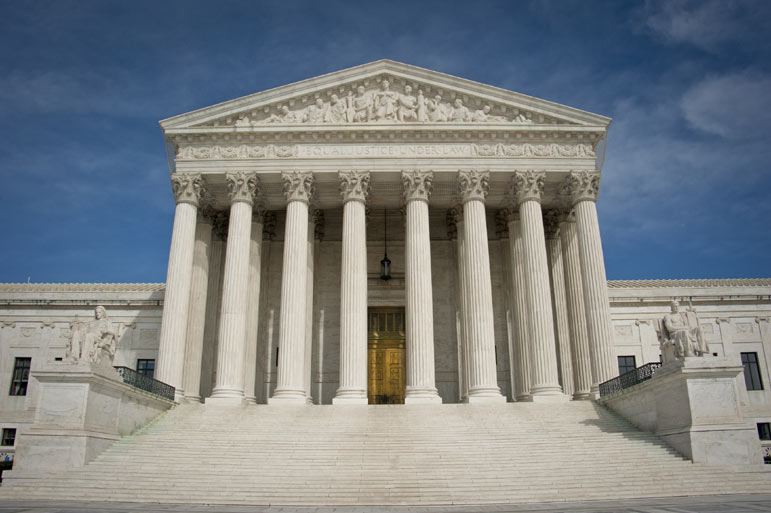
But that changed Monday, with justices issuing a flurry of explanations and recriminations on cases decided weeks ago. The writings named names and exposed a bitter rift between members of the court on one of the most emotional and irreversible decisions they make.
Decisions on last-minute stays usually come with only a minimum of reasoning. But three justices issued a set-the-record-straight opinion that took aim at one of Justice Stephen Breyer's dissents from a month ago. Breyer had said the court's conservatives deviated from "basic principles of fairness" in refusing to take more time to consider the plea of an Alabama murderer, Christopher Lee Price, who had asked to be executed by inhaling nitrogen gas rather than risk a "botched" lethal injection.
"There is nothing of substance to these assertions," wrote Justice Clarence Thomas, joined by Justices Samuel Alito Jr. and Neal Gorsuch. They said that Breyer's reasoning, which was joined by the court's three other liberals, "does not withstand even minimal legal scrutiny."
In a separate filing, Alito also defended a much-criticized ruling from the court in February that allowed the execution of a Muslim inmate, also in Alabama, where he was denied a request to have an imam at his side in the death chamber.
"The court was presented at the last minute with claims that raised complicated issues that cannot be adequately decided with hasty briefing and an inadequate record," Alito wrote. He and the court's other conservatives allowed the execution of Domineque Ray to proceed.
The court's decision drew criticism from the left and the right, and a stinging dissent from Justice Elena Kagan and the other liberals: "Ray has put forward a powerful claim that his religious rights will be violated at the moment the state puts him to death."
Alito also said he disagreed with the court's decision in late March to stop the execution of a Buddhist inmate in Texas who was not allowed a priest of his faith to be with him. In that case, it was explained Monday, Chief Justice John Roberts Jr. and Justice Brett Kavanaugh joined the liberals to stop the execution, because they felt his objection has been raised in a timely manner.
The back-and-forth exposes raw feelings among the justices over the death penalty, and whether it can be carried out in an equitable manner. The catalyst seems to be Kavanaugh's replacement of Justice Anthony Kennedy.
Kennedy was not seen as a reliable vote either for liberals, who often but not always are willing to delay executions for another look, or conservatives, who seem to have had enough of last-minute requests for stays from inmates whose crimes were committed long ago.
The strategy, Thomas wrote Monday, "is no secret, for it is the same strategy adopted by many death-row inmates with an impending execution: bring last-minute claims that will delay the execution, no matter how groundless. . . . [S] uch delay both rewards gamesmanship and threatens to make last-minute stay applications the norm instead of the exception."
The court's "dallying," Thomas wrote, meant that Alabama had to delay Price's execution. He quoted Alabama Gov. Kay Ivey, a Republican, as calling that a "miscarriage of justice."
Bessie Smith, whose husband, Bill, a pastor, was killed just before Christmas 1991 by Price and another man, "waited for hours with her daughters to witness petitioner's execution, but was forced to leave without closure," Thomas wrote.
In his dissent in April, Breyer had written that his colleagues turned down his request to delay Price's execution so that they could discuss it together at a previously schedule conference the next morning.
"To proceed in this matter in the middle of the night without giving all members of the court the opportunity for discussion tomorrow morning is, I believe, unfortunate," Breyer wrote.
He has previously said that after decades on the Supreme Court, he has doubts the death penalty can be constitutionally applied, and has suggested the court take up the issue.
That seems not at all likely, with a majority of the court not only supporting the death penalty, but ready to move more quickly on the backlog of executions.
In the opinion he contributed Monday, Kavanaugh said he "fully" agreed with Alito that counsel for death row inmates must "raise any potentially meritorious claims in a timely manner, as this court has repeatedly emphasized."
Joined by Roberts, Kavanaugh said the Muslim inmate Ray had not done so. But he said Patrick Murphy, the Buddhist in Texas, had met the standard.
And he said the court's decision to stay the execution had prompted Texas to change its execution protocol so that it was equitable. Texas allowed only Texas prison chaplains in the death chamber, and none were Buddhist.
"Five days after the court granted a stay, Texas changed its unconstitutional policy, and it did so effective immediately," Kavanaugh wrote. "Texas now allows all religious ministers only in the viewing room and not in the execution room."
Such a policy "should alleviate any future litigation delays or disruptions," he said.
Kavanaugh's view does not set a precedent, but indicates that a majority of the court feels that the religious needs of inmates must be respected and treated equally. In other words, if a Christian inmate has a right to a chaplain of his faith in the death chamber, so must a Muslim. Or that spiritual advisers of all faiths may be banned.
Alito, Gorsuch and Thomas were not so sure that issue was closed.
If Murphy, the Buddhist, were not in prison, "Texas could not tell him that the only cleric he could have at his side in the moments before death is one who is approved by the state," Alito wrote.
"But this court's precedents hold that imprisonment necessarily imposes limitations on a prisoner's constitutional rights."
Sign up for the daily JWR update. It's free. Just click here.
(COMMENT, BELOW)


 Contact The Editor
Contact The Editor
 Articles By This Author
Articles By This Author